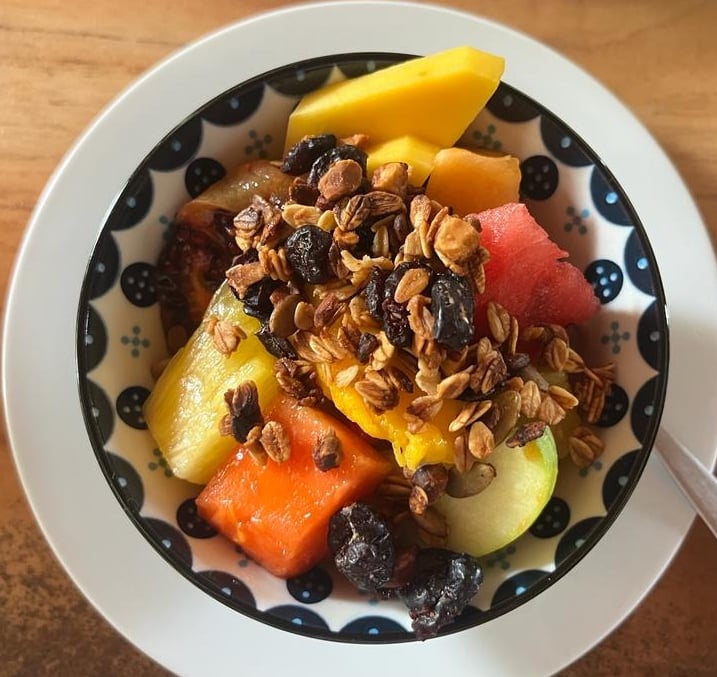
eat THE
ayurveda WAY
IT’S TIME TO
ABOUT AYURVEDIC CUISINE
In our retreats we are preparing personalized ayurvedic gourmet dishes for you, to harmonize your doshas and invite you to an unforgettable culinary experience that you will never forget.
Ayurvedic cuisine is a time-honored culinary tradition rooted in the ancient Indian system of medicine, Ayurveda. It is a holistic approach to food that aims to balance and nourish the body, mind and spirit. Ayurveda considers food as medicine, recognizing the profound impact it has on our well-being.
The principles of Ayurveda emphasize the use of fresh, seasonal, and locally-sourced ingredients to create a harmonious blend of flavors, textures, and colors. The cuisine focuses on the balance of six tastes - sweet, sour, salty, bitter, pungent, and astringent - to stimulate the senses and promote overall vitality.
Ayurveda categorizes foods based on their inherent qualities and their effects on the body's doshas, or energetic forces, Vata, Pitta, and Kapha. The aim is to maintain or restore the balance of these doshas, which is believed to promote good health and prevent disease.
Ayurvedic cooking techniques often involve gentle methods such as steaming, boiling, or lightly sautéing foods to retain the nutritional integrity of the ingredients. Spices and herbs play a significant role in Ayurvedic cuisine, not only for their aromatic and flavorful properties but also for their therapeutic benefits. Commonly used spices include turmeric, cumin, coriander, ginger, and cinnamon, each with its unique healing properties.
Meals are designed to be easily digestible, promoting optimal nutrient absorption and ensuring efficient elimination of waste. The focus is on whole foods, including grains, legumes, fresh fruits and vegetables, nuts, seeds, and dairy products in moderation.
Beyond nourishing the physical body, Ayurveda cuisine seeks to create a harmonious and mindful eating experience. It encourages the practice of mindful eating, where one is fully present and appreciative of each bite, fostering a deeper connection with food and promoting overall well-being.
In summary, Ayurveda cuisine is a delightful blend of flavors, textures, and colors that nourishes the body, balances the doshas, and promotes holistic well-being. It's a celebration of nature's bounty, a reflection of ancient wisdom, and a pathway to optimal health.


BREAKFAST
A typical Ayurveda breakfast is designed to provide nourishment, balance, and energy to start the day on a healthy note. It typically includes a variety of wholesome and easily digestible foods that cater to individual dosha types and support optimal digestion.
We serve fresh, seasonal fruits and nuts, homemade cheese and bread, warm grain-based dishes like cooked quinoa, porridge or rice pudding made with spices such as cardamom, cinnamon turmeric, cumin, coriander, or fennel. These spices not only add flavor but also offer numerous health benefits, such as reducing inflammation and improving digestion. Herbal teas or warm water infused with lemon and ginger are commonly consumed alongside the meal to help cleanse and hydrate the body.
Our breakfast provides sustained energy and promotes overall well-being while serving as a foundation for a healthy and mindful start to the day.


LUNCH
A typical Ayurvedic lunch is a balanced and nourishing meal that focuses on incorporating a variety of flavors, textures, and nutrients to support optimal digestion and overall well-being. It typically consists of a combination of whole grains, vegetables, legumes, and spices tailored to individual dosha types. Our lunch is often a serving of cooked grains like basmati rice or quinoa which provide a good source of energy.
Accompanying the grains are a variety of vegetables cooked in a way that preserves their natural flavors and nutrients: lightly sautéed or steamed and seasoned with Ayurvedic spices like turmeric, cumin, and coriander, which not only enhance taste but also have therapeutic properties.
Legumes such as lentils, mung beans, or chickpeas are a common protein source in Ayurvedic lunches. They are rich in fiber and provide essential amino acids. Legumes are usually prepared as soups, stews, or dals and are flavored with spices and herbs to enhance digestion and add depth to the dish.


DINNER
A typical Ayurvedic dinner is a light and nourishing meal that focuses on balancing the doshas, promoting digestion, and supporting optimal health and well-being.
Our dinners are based on warm soups prepared with a variety of wholesome ingredients that are easily digestible and carefully selected to create a harmonious and balanced meal. To enhance the taste and therapeutic properties, Ayurvedic spices and herbs are added to the soup. Commonly used spices include turmeric, cumin, coriander, ginger, and black pepper, which not only add flavor but also possess digestive and healing properties.
The choice of vegetables for the soup depends on individual dosha considerations and seasonal availability. Protein sources can be added for a balanced meal. This can include lentils, mung beans or tofu.
Soups may also incorporate grains like quinoa, barley, or rice to add texture and substance. These grains provide a source of complex carbohydrates and additional nutrients.
Our dinners often include a side of steamed vegetables, a small portion of whole grains, or a light salad to provide a well-rounded and balanced meal.
CONTACT US
Bon Appetit, Gourmand!
We invite you on a culinary journey through the world of Ayurvedic cuisine. Please let us know if you have any food incompatibilities or allergies or if there are particular spices or foods that you don't like.

